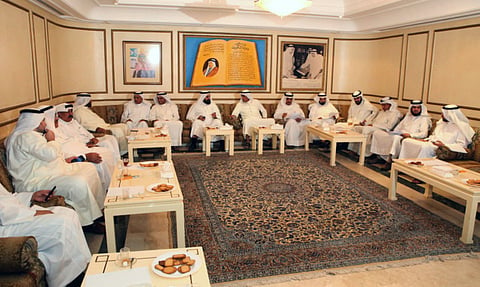Kuwaitis hope political tensions ease
Increasingly divided opposition weighing options, including boycott

Manama: Kuwait’s opposition was on Monday still weighing its dwindling options after the Constitutional Court upheld a decree that amended the electoral law and dissolved the parliament, forcing new elections within two months.
The ruling on Sunday meant that the next national polls to elect the new lawmakers would be held under the “one voter, one vote” principle, the main reason that made the opposition boycott the last parliamentary elections on December 1.
In their first reactions to the ruling, Kuwaitis said that they accepted the court’s decision and that they would plan their next moves accordingly.
However, veteran opposition leader Ahmad Al Saadoon, a former parliament speaker, insisted that the opposition would boycott the next parliamentary elections.
“We ask the Kuwaiti people to boycott the elections because they will assume the responsibility of voting in a terrible parliament,” he said at the end of a meeting he held with key opposition figures on Sunday evening. “We cannot act as false witnesses and be part of a parliament that the authorities want to dominate. This is going to be a long battle and it requires the solidarity of all Kuwaitis,” he said at the meeting.
However, Al Saadon will face the formidable task of convincing the opposition of the merit of the boycott call and the “battle” to change the situation on the ground.
Opposition figure Mohammad Al Jasem, a lawyer, said that the opposition bloc needed first to engage in a meaningful introspection.
“The opposition has made serious mistakes that have deeply harmed it,” he reportedly told Al Yawm private television channel. “It has to make clear choices and decide about the language it wants to use, its mechanisms and its leaders. We do not have perspectives and no philosophy and the number of followers has dwindled,” he said.
The lawyer said that the opposition started off strongly, stretching the level of political demands and mobilising a large number of people.
“We had families and young people with us as well, but then some of the leaders decided to tone down their speeches and lower their demands under the hope of getting elected in the parliamentary polls. Unfortunately, it did not work out and the movement was eroded,” he said.
Jurists in the Kuwaiti capital reportedly said that the laws enacted by the dissolved parliament would not be affected by the ruling and that the next step would be to call for the election of a new parliament within two months.
For several political academics, the court ruling meant a new drive towards “a more stable future for Kuwait” and “a new opportunity to take part in the elections following a period of political tension that has alienated the street.”
“The participation in the forthcoming elections will be more intense after several political and tribal forces said that they accepted the ruling by the Constitutional Court even before it was announced,” Abdullah Al Ganem, a political science professor, said, quoted by Al Watan daily. “Any boycott would have little impact, particularly that the common people are fed up with the political tension that gripped the nation and want stability after the court’s decision. The number of people who attended the latest rallies was weak,” he said.
Ebrahim Al Hadyan, another political sciences professor, said that street tactics would fail. “All political trends across the spectrum have now a chance to be an active part of the elections,” he said, “The idea of going to the streets to apply pressure will not have the same level of response it had in the past.


